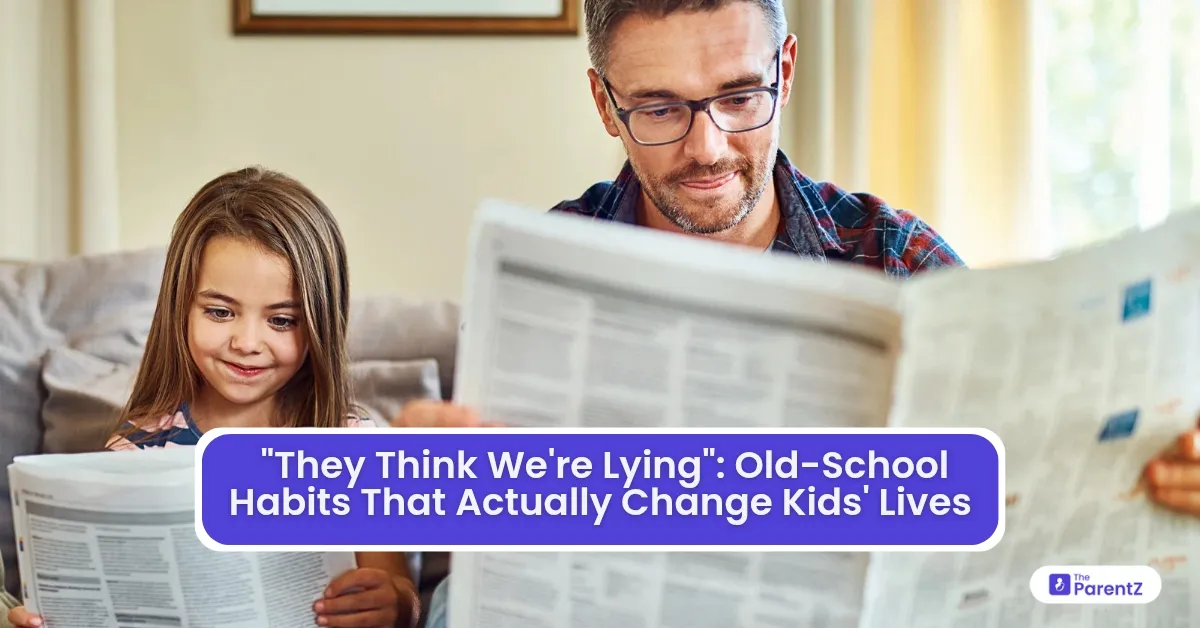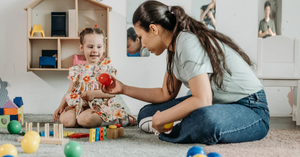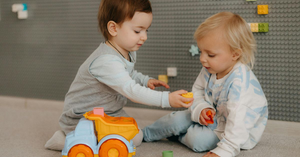We've all been there – rolling our eyes as our parents delivered those same old lines about drinking water, going to bed early, or writing things down. As parents, we now find ourselves echoing these same pieces of advice, only to be met with the same skepticism we once showed. It's almost comical how the cycle repeats itself, with each new generation convinced that their parents' wisdom is outdated or unnecessary.
But here's the thing—many of those seemingly simple habits our parents and grandparents insisted upon weren't just arbitrary rules. They were life skills that stood the test of time because they actually worked. Let's explore some of these "eye-roll-inducing" habits that kids often dismiss but can genuinely transform their lives when embraced.
Why Kids Doubt Old-School Habits
Let’s be honest: when you’re young, advice about making your bed or waking up early seems like it’s designed to make your life harder. Kids crave autonomy and often express resistance, sometimes overtly (“Why should I?”) and sometimes covertly (like shoving everything under the bed and calling it “clean”). The truth is, kids are developing their own sense of agency and want to do things their way. Plus, the benefits of these habits aren’t always obvious in the short term, so it’s easy to dismiss them as “parent myths.”
The Morning Routine Revolution
"Wake up early," we tell them, as they groan and pull the covers over their heads. To kids, this feels like unnecessary torture invented by adults who hate fun. But there's science behind starting the day with intention.
The truth is, establishing consistent sleep patterns helps regulate the body's circadian rhythm, improving everything from concentration to mood stability. Kids don't see the immediate payoff, but parents know the cumulative effect is real. Early risers often have more time for breakfast, experience less rushing stress, and start their day on a more peaceful note.
The "Put Down Your Phone" Predicament
Nothing triggers more dramatic sighs than asking a teenager to limit screen time before bed. To them, we might as well be asking them to communicate by carrier pigeon.
Research consistently shows that blue light from screens interferes with melatonin production, the hormone that helps us sleep. What feels like parental overreach is actually protection for developing brains that need quality rest more than another hour of scrolling. Better sleep means better mood regulation, improved academic performance, and healthier social interactions.
The Hydration Situation
"Drink water, not just soda." It's such a simple recommendation that kids often dismiss it as parents just being boring. But proper hydration affects everything from cognitive function to skin health.
Kids often don't connect their physical symptoms – headaches, mood swings, fatigue – with dehydration. They're not being stubborn for no reason; they simply haven't experienced the clear cause-and-effect relationship that adults recognize. Water is literally the fuel that keeps their growing bodies functioning optimally.
The Writing-It-Down Wisdom
In an age of digital everything, suggesting that kids write things down on paper seems positively prehistoric to them. "I'll remember it," they insist, or "I can just put it in my phone."
Neuroscience supports this "outdated" advice. The physical act of writing creates neural pathways that enhance memory and comprehension in ways that typing simply doesn't. What seems like just another annoying requirement is actually training young brains to process information more effectively.
The "Carry Cash" Custom
"Always have some cash on you" sounds hopelessly outdated to digital natives who've grown up with payment apps and cards. Why carry around paper money when everything is electronic?
Yet this old-school habit remains surprisingly relevant. Cash creates tangible awareness of spending in a way digital transactions often don't. It teaches immediate budgeting skills when you can physically see your money diminishing. And despite our increasingly digital world, cash remains the only payment method that works during power outages and system failures, especially in the many small businesses that still operate on cash-only policies or have minimum card purchase requirements.
The Outdoor Adventure Mandate
"Go outside and play" - a phrase that competes with ancient hieroglyphics in terms of how outdated it sounds to modern kids. Yet regular outdoor time provides benefits that no indoor activity can match.
Natural light regulates mood and sleep cycles, while physical movement in varied environments develops better coordination and spatial awareness. The unstructured nature of outdoor play also fosters creativity and problem-solving in ways that structured activities often don't. Plus, the microbiome exposure from nature actually strengthens developing immune systems.
The "Eat Your Vegetables" Edict
Perhaps no dinner table phrase is met with more resistance than this classic parental mandate. Kids wonder why we insist on these strange plants when perfectly good pizza exists.
The reality is that nutritional habits formed in childhood set patterns for lifetime health. Those colorful foods contain micronutrients essential for brain development, immune function, and even mental health stability. The connection between gut health and mood regulation is now well-established science, making those vegetables not just good for physical health but emotional well-being too.
The Reading Ritual
"Read something every day" often falls on deaf ears when competing with the instant gratification of videos and games. Books seem slow and demanding by comparison.
What kids don't yet grasp is that reading isn't just about consuming content—it's about developing the brain's architecture. Regular reading builds vocabulary, increases attention span, and enhances empathy through exposure to diverse perspectives. Most significantly, it develops critical thinking skills by requiring active engagement rather than passive consumption. In a world of abundant information but scarce wisdom, these skills become increasingly valuable.
The Face-to-Face Friend Time
"Why don't you invite friends over instead of just texting them?" This suggestion often baffles digital natives who see virtual communication as equivalent to in-person interaction.
However, real-life social skills - reading facial expressions, navigating awkward pauses, sharing physical space - develop primarily through in-person interactions. These are the foundational skills that build emotional intelligence and relationship capabilities that even the best emoji selection can't replace.
The "Smile Often" Suggestion
"Put on a smile" can sound like parents are encouraging fake positivity or dismissing genuine feelings. Kids understandably bristle at the suggestion that they should mask their authentic emotions.
But the science behind smiling reveals something fascinating: facial expressions don't just reflect our feelings—they can actually influence them. The physical act of smiling triggers neural messaging that benefits our health and happiness. It's not about faking happiness; it's about understanding that our physical actions can gently redirect our emotional state. Even a brief smile can reduce stress hormones and trigger mood-enhancing neurotransmitters.
The Boredom Benefit
When kids complain of boredom and parents refuse to provide entertainment, it can feel like cruelty to the young mind. "Figure something out" hardly seems helpful in the moment.
Yet boredom is actually the precursor to creativity. When the brain isn't being constantly stimulated externally, it begins to generate its own engagement - the very definition of imagination and creative thinking. Those moments of "nothing to do" are actually critical developmental opportunities for problem-solving and self-directed learning.
The Chore Challenge
"Clean your room" or "help with the dishes" - phrases that seem designed to ruin a perfectly good childhood day. Kids see no benefit in these tasks, and they just seem to need to do them again tomorrow.
But regular chores teach delayed gratification, contribute to a sense of competence and self-efficacy, and help children understand their role in community maintenance. Research shows that children who have regular responsibilities at home actually develop better executive functioning skills - the very abilities needed for academic and career success later.
The Gratitude Practice
"Say thank you" isn't just about manners - it's about mindset. While kids might mechanically mutter thanks without feeling it, the practice of acknowledging positive things trains the brain to notice them more frequently.
Regular gratitude expression has been linked to higher levels of happiness, improved sleep, and even stronger immune function. What seems like just a social nicety is actually powerful mental health training.
Bridging the Generation Gap
So, how do we get kids to adopt these habits without the power struggles?
First, explain the why, not just the what. Kids are natural questioners, and "because I said so" rarely motivates lasting change.
Second, be willing to compromise on the how. Perhaps they'll drink more water if they have an appealing water bottle, or they'll limit screen time if they can choose another enjoyable bedtime activity instead.
Third, model the behaviors yourself. Kids have finely-tuned hypocrisy detectors. If you're scrolling on your phone while lecturing about screen time, your message loses all credibility.
Finally, celebrate small wins. When you notice positive changes from these habits, point them out without the "I told you so" energy. "I noticed you seemed really focused during your test today. I wonder if getting enough sleep last night helped with that?"
Conclusion
Old-school habits aren’t just empty traditions; they’re time-tested tools that really change lives. If you’re a kid reading this, here’s the real talk: your parents aren’t lying to you. These habits may seem old-fashioned or annoying, but they’re like secret superpowers. They help you become more confident, independent, and ready for whatever life throws your way. And one day, you might find yourself telling your own kids the same things, because you’ll know from experience that they work.








Be the first one to comment on this story.